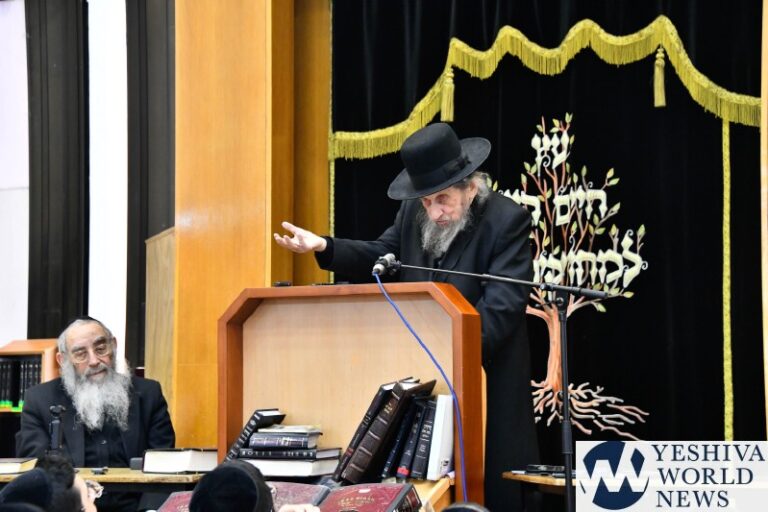(By Rabbi Yair Hoffman for the Five Towns Jewish Times)
It is a portrait in contrasts. Prime Minister Menachem Begin faced an irreligious Knesset membership when he argued that El Al, Israel’s national airline should not be flying on Shabbos.
He began: Forty years ago I returned from exile to Eretz Yisrael. Engraved in my memory still are the lives of millions of Jews, simple, ordinary folk, eking out a livelihood in that forlorn Diaspora where the storms of anti-Semitism raged. They were not permitted to work on the Christian day of rest, and they refused to work on their day of rest. For they lived by the commandment, ‘Remember the Sabbath day to keep it holy.’ So each week they forswore two whole days of hard-won bread. This meant destitution for many. But they would not desecrate the Sabbath day.
Shabbat is one of the loftiest values in all of humanity, it originated with us. It is all ours. No other civilization in history knew of a day of rest. Ancient Egypt had a great culture whose treasures are on view to this day, yet the Egypt of antiquity did not know of a day of rest. The Greeks of old excelled in philosophy and the arts, yet they did not know of a day of rest. Rome established mighty empires and instituted a system of law still relevant to this day, yet they did not know of a day of rest. Neither did the civilizations of Assyria, Babylon, Persia, India, China – none of them knew of a day of rest.”
“One nation alone sanctified the Shabbat, a small nation, the nation that heard the voice at Sinai, – so that your man-servant and your maid-servant may rest as well as you.’ “Ours was the nation that enthroned Shabbat as sovereign Queen.”
“So, are we in our own reborn Jewish state to allow our blue-and-white El Al planes to fly to and fro as if broadcasting to the world that there is no Shabbat in Israel? Should we, who by faith and tradition heard the commandment at Sinai, now deliver a message to all and sundry through our blue-and-white El Al planes – ‘No, don’t remember the Sabbath day. Forget the Sabbath day! Desecrate the Sabbath day.’ “I shudder at the thought.”
That was Prime Minister Menachem Begin.
This week, on the other hand, Yair Lapid remarked:
“If Netanyahu fails to sign the dispensation for soccer games on Shabbos, this will be a disgraceful surrender to the chareidim at the expense of people who need to work on weekdays and soldiers, for whom this is the only possible time to view soccer games.”
It is clearly a portrait in contrasts.
What Yair Lapid is missing is that Shabbos has always been viewed as the symbol or flag of the Jewish nation. Just as patriots look at their flag as more than a mere dyed cloth with fancy designs, so too is Shabbos viewed in the eyes of the Jewish people. The Sheiltos of Rav Achai Gaon explains that Hashem instructed us to rest on Shabbos, just as He rested from all creative acts on Shabbos. Observing Shabbos is a sign of our deep belief in G-d – that it was He who Created the world. But it is more than this too.
Yair Lapid must be taught that our belief in G-d is not just limited to the notion that an omnipotent entity created the world. No. An integral aspect of Torah theology is that this omnipotent entity is the source of all good.
He rewards good and punishes evil. The Jewish understanding of G-d and His unique Oneness is that ethics and monotheism are intrinsically interwoven with each other.
In other theologies they may be two separate concepts.
Not so in Judaism.
A belief in the Oneness of G-d perforce also includes the notion that He defines what goodness is. Altruism, goodness, and ethical behavior are not the results of evolutionary biology – no, they are part and parcel of the Creator Himself.
Indeed, this is the raison d’être of Creation itself – so that Hashem – G-d can reward those who do good and follow His will .
If, in the path of life, we successfully attempt to emulate G-d – then we will be rewarded. The Observance of Shabbos is thus the flag of the Jewish people – the idea and notion that represents all this.
There is an event that Yair Lapid needs to consider. It is an event that has never before happened in recorded history. The event can be described as a series of historical occurrences that are indisputable facts. This event has been hailed by millions of people as nothing short of miraculous.
But first – a historical background.
Two thousand years ago, Roman civilization dominated the world. Many nations have battled the Romans, the Mithridates, the Parthians, the Sassanians, and especially the Carthaginians. The Carthaginians had three major wars with the Romans and lost the last and most critical one. The Romans destroyed the city of Carthage. They allegedly poured salt throughout Carthage to ensure that it never be rebuilt.
The Incas and the Aztecs were highly evolved civilizations in the Americas. The Spanish conquerors destroyed these civilizations approximately 500 years ago. These people assimilated into the melting pot of what is now Latin America.
It is unimaginable to think that these civilizations, the Carthaginians, the Incas, and Aztecs could survive intact after these long centuries “exiled,” so to speak, from their homeland or city and deprived of their socio-religious cultural center.
It is even more unimaginable for these civilizations, after many long centuries of such an exile, to return to their land. Finally, it is entirely inconceivable that the homeland remained unimproved and uncultivated for those many long centuries, until its people had returned.
Yet, this is precisely what happened to the Jewish people.
The Romans had conquered the land of Israel. They destroyed the Temple. They ransacked Jerusalem and exiled the Jewish people.
Josephus (Wars of the Jews 7:1:1) writes that Jerusalem “was so thoroughly razed to the ground by those that demolished it to its foundations, that nothing was left that could ever persuade visitors that it had once been a place of habitation.” The Romans re-named the holy city of Jerusalem “Aelia Capitolina.” The Jews were exiled and spread throughout the western world. There they remained for twenty, yes, twenty centuries.
All of this leads us to one fact that Yair Lapid should learn and learn well. Prime Minister Menachem begin knew it, but Yair Lapid, apparently, does not.
There is a G-d that runs the world.
This G-d is clearly concerned with the destiny of the Jewish people. This G-d, according to the sacred writings of the Jewish people, rewards good and punishes evil.
Indeed, G-d, in the eyes of Judaism, is the essence of all that is good. All this was revealed to the Jewish nation at the foot of Mount Sinai. This occurred over 3300 years ago.
The Jewish people were given a unique mission. The mission is to declare the concept of G-d and the obligation to emulate Him in all we do – in all our actions. This mission has only been partially completed. The vast majority of the peoples of the world are only somewhat aware of who G-d is, but have a woefully incomplete picture.
Judaism has always felt that concepts and ideas are not enough – they must be accompanied by action.
For example, a person who wishes to become a master musician cannot merely peruse the musical notes of a concerto but must actually practice music. Hours and hours of practice are necessary. By the same token, a student of the martial arts cannot become a proficient fighter merely by reading a karate instruction manual. Years and years of practice are required for the proficiency and expertise to develop.
The prophets of Israel speak of the noble ideals of universal peace, brotherhood, seeking truth and justice, and walking humbly before G-d. They speak of the notion of hakaras haTov – recognizing the good that one has done for them. But Judaism requires that these noble ideas be put into action through the vehicle known as Mitzvah.
Thus, there is a commandment to give charity. There is a commandment to recite a short formula thanking G-d for the bread that we have consumed. And the observance of Shabbos is no different.
Shabbos observance has had and continues to have an enormous effect upon the soul of the Jewish nation. The concept of G-d to the genuine Sabbath observer is tangible and real. The exodus from Egypt is as genuine and vivid to the Sabbath observer as is the placing of a man on the moon during the Apollo space missions in the 1960’s.
So, Mr. Lapid, please set aside your attacks on Shabbos and start learning about what it means to the Jewish people.
And for those who are curious, what lies behind the prohibition of soccer games on Shabbos?
The Talmud Yerushalmi (Taanis 4:5) tells us of a great city named Tur Shimon with its very own Tomchei Shabbos that delivered 300 barrels of material to the poor each Friday.
The Talmud, however, goes on to explain that this city was ultimately destroyed.
Why was it destroyed? One opinion says that it was because of untoward activity. Another opinion says that it was on account of, yes, ball playing.
Ostensibly, it was ball playing on Shabbos as most of the commentators explain. Indeed, Rav Huna in Midrash Aicha Rabasi explicitly states that the ball playing was on Shabbos. This Yerushalmi is cited by the Bais Yoseph (OC 308). Finally, there is a third opinion (See Rokeach Hilchos Shabbos 55) that they played ball on Shabbos and did not learn Torah.
NUMEROUS POSSIBILITIES
What is remarkable is that nowhere in these sources (other than in the words of the Rokeach) is the exact problem with ball-playing on Shabbos fully or even partially explained. What was the exact violation? There is, of course, an entire litany of halachic possibilities as to the exact nature of the problem (which, as the reader may have surmised, will be explored), but perhaps the very silence of the sources is instructive in and of itself.
LOST OPPORTUNITY
Perhaps, the reason Tur Shimon was destroyed was that this remarkable town – with such remarkable chessed going on in its midst should have utilized the Shabbos as a means to further their Dveikus Bashem – their cleaving to Hashem. Excessive ball-playing, or any other mundane activity can sometimes be indicative of a lack of such a relationship with Hashem—and that lost opportunity may very well have been the reason for Hashem not having saved this town from destruction.
CARRYING
But let’s get to the possible halachic issues involved. One possibility is the prohibition of carrying (not the basketball violation – the Shabbos one). The Machzor Vitri (Hilchos Pesach #94) actually permits a type of ball-playing on Yom Tov on account of it being a form of Simchas Yom Tov! Indeed, the Responsa of Rashi (285:2) entertains a similar position. But even according to this more lenient view, the permission is limited to Yom Tov and not Shabbos. Indeed, Rav Avrohom Yitzchok Kook makes this point very clearly when he unabashedly castigated a Rabbi who thought to permit it.
MUKTZAH
There is a second possibility. The Shevilei haLeket (Shabbos 121) considers balls as items of no purposeful utility and deems them to be Muktzah. The Ramah (OC 518:1 and 308:45), however, rules that it is not considered Muktzah and that a ball would have utility. The Shulchan Aruch (OC 308:45) rules that it is forbidden to play ball on Shabbos and on Yom Tov. The Mishna Brurah explains that it is because he holds that the balls have no purposeful utility and are Muktzah. The Aruch HaShulchan tends to be stringent, as well, in regard to ball playing on Shabbos
LEVELING THE GROUND
Another possible issue is the problem of leveling the ground. The ball may cause some ground leveling problems. It would seem, however, that the ground leveling problem is limited to games where the ball is to be rolled on the ground as the purpose and method of game-playing (Rabbeinu Chananel would disagree with this, but Halacha seems to follow other opinions). There thus might be a distinction between soccer and basketball, at least in regard to this particular concern. Some (e.g. the Shvilei HaLeket) are of the opinion that the Rabbis therefore prohibited ball-playing even in areas that are paved. There is also the possibility that the noises involved in ball playing may be halachically problematic too (ibid). However, the views of the Shvilei HaLeket have not been cited authoritatively by the Poskim.
THE GREAT DEBATE
On the stricter side, it is interesting to note that the Ramah’s own cousin, the Maharshal (Beitzah 1:34) questions the lenient position of his cousin and writes that if he had the ability he would forbid it entirely. The Maharshal is quoted by the TaZ (OC 518:2) and he labels it an “evil custom.”
CASE OF MAHARITATZ
Rabbi Yom Tov Ben Moshe Tzahalon (1559-1638), author of the Maharitatz in the new responsa (#202) discusses the question of a large city of Torah scholars that never had any ball playing and a group of gentiles came and began ball playing. Eventually a group of young men arose and began playing on the Shabbos with gambling and betting and eating without rinsing of the hands. Some wished to refrain from forbidding it on account of the position of the Ramah. The Maharitatz blasted those who refrained from forbidding it and that those who violated it should seek acts of contrition and Teshuvah.
CONCLUSIONS
In conclusion, Tur Shimon was a wealthy vibrant town filled with acts of charity and unprecedented Chessed. It fell, according to many authorities, on account of ball playing running out of control. Hundreds of years later, in the time of the Maharitatz, another great city also fell victim to Shabbos violation and other violations on account of the inroads made by this type of activity.
Let’s try to prevent Yerushalayim from following in the path of these two cities. Let’s keep Yerushalayim in Eretz Yisroel, and a light unto the world.
The author can be reached at [email protected]
(YWN World Headquarters – NYC)












One Response
very nice article.